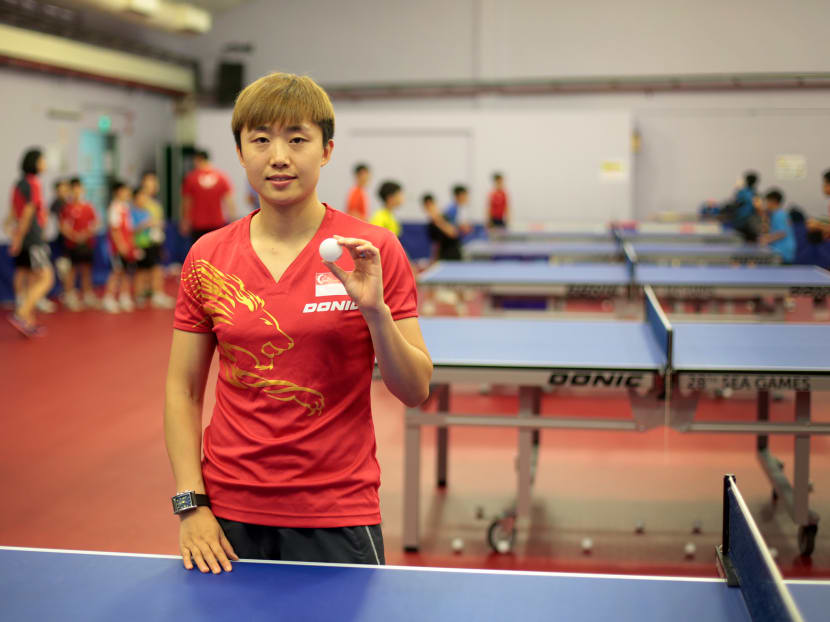Bold steps by STTA but fans must stay the course
It is a game of lightning-quick reflexes, fast serves and tricky spins. Off-court here in Singapore, table tennis has similarly served up its share of plot twists and turns over the past 12 months.

Feng’s problems with the STTA have been well documented and the decision to axe her from the national squad suggests that change is expected in the months ahead for the sport. TODAY file photo
It is a game of lightning-quick reflexes, fast serves and tricky spins. Off-court here in Singapore, table tennis has similarly served up its share of plot twists and turns over the past 12 months.
On-court spats, ill-discipline, a Corrupt Practices Investigation Bureau probe, and a barren run at the Rio Olympics — these are some of the athlete-related issues the Singapore Table Tennis Association (STTA) has had to battle in recent times.
And to cap off a tumultuous year for Singapore’s most storied sport, its top female paddler Feng Tianwei was axed from the national team yesterday, with the STTA stating that the 30-year-old does not fit into its current plans for rejuvenation.
The shock announcement came a day after the STTA’s decision to sack Li Hu from the men’s team for violating house rules.
World No 6 paddler Feng’s problems with STTA have been well documented, with her unhappiness with the coaching set-up culminating in a player-coach spat last year at the Polish Open that resulted in a warning for team-mate Yu Mengyu, while former head coach Jing Junhong was redeployed to the youth team.
The decision to cut the Republic’s most-decorated Olympian — who won a team silver at the 2008 Beijing Games, and two bronze medals at London 2012 — and world team champion from its national set-up is expected to send shock waves through the local and international community, as well as thousands of table tennis fans here. Feng assured her fans in a Facebook post yesterday that she will not be leaving the international scene, stating that she could continue to compete in international competitions.
Despite Feng’s assurances, the end of the relationship between the player and the association after nine years suggests that change is expected in the months ahead for the sport.
So what’s next for Singapore table tennis?
Jing Junhong was one of the early pioneers who played for Singapore as a naturalised citizen. Married to former national paddler Loy Soo Han, she won numerous titles at the SEA Games and major competitions.
But acceptance of the STTA’s foreign-born talent has often been lukewarm, with many Singaporeans often taking to social media to criticise the sport’s reliance on China-born athletes. The common gripe was that they were taking up the opportunities meant for local athletes, resulting in less resources being invested in local paddlers, as well as the China-born athletes’ seeming reluctance to integrate with their fellow Singaporeans.
Critics of the foreign talent scheme will be delighted to hear of the STTA’s decision to groom local talent for the future, with an eye on fielding a local-born athlete at the 2020 Olympic Games in Tokyo. While the association has put in place initiatives such as the PAP Community Foundation table tennis programme in kindergartens in recent years, it said yesterday that greater emphasis will be placed on youth development and more local players — five young paddlers aged 16 and 17 — will be promoted to the intermediate squad.
While the Republic’s national team line-up once included locals like Tan Paey Fern, Koh Li Ping and Lai Chin Pang, it remains to be seen if the STTA will be able to groom more young players to take over from the seniors in the future.
A successful haul at the SEA Junior Table Tennis Championships — 10 golds, five silvers and six bronzes — and achievements at international tournaments such as the ITTF Chinese Taipei Junior and Cadet Open, and Asian Junior Exchange Games suggest there is local promise here on our shores.
However, the perennial problem of balancing studies and career with sports, as well as expectations of parents, could also be a major obstacle to the STTA’s ambitions for its local youth. Weaning off Singapore’s reliance on foreign-born players could well backfire for the sport, as funding for national sports associations here is also tied to key performance indicators such as results at major competitions like the South-east Asian, Asian, Commonwealth and Olympics.
A dearth of medals could see a cut in funding for the STTA, and interest from fans and sponsors could die down as the association waits for its young local players to blossom and hopefully develop into world-class contenders. But after the clamour from fans calling for local faces, the onus is on them to keep the faith, and stay the course with Singapore table tennis as it rebuilds for the future.
The Republic’s most storied and successful sport is taking a bold step, and while some may call it a step back after years of success — and Olympic medals — with China-born players, surely this courage to take the road less travelled should be applauded.





